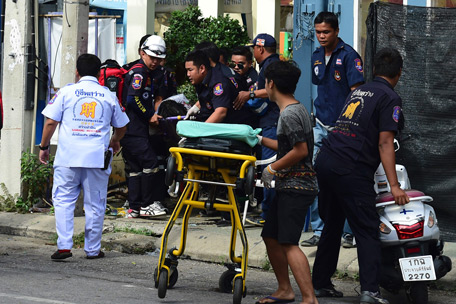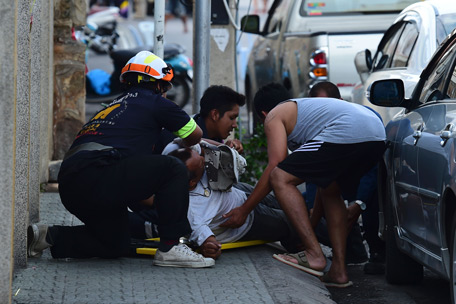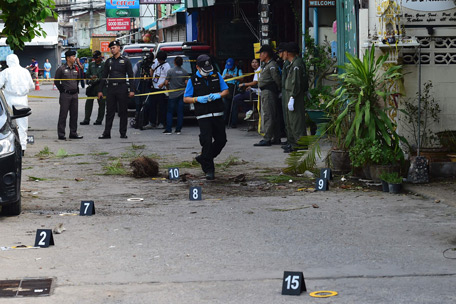- City Fajr Shuruq Duhr Asr Magrib Isha
- Dubai 04:27 05:45 12:20 15:47 18:49 20:07
Thai police said Sunday they "know who was behind" a recent wave of bombings that rattled tourist destinations across the south, shattering a surface calm imposed by the kingdom's military junta.
No one has claimed responsibility for at least 11 small explosives and series of suspected arson attacks that ripped across core tourist hubs Thursday night and Friday morning, killing four locals and wounding dozens, including European tourists.
The bombs, most of them detonated in twin blasts, struck holiday resorts during a long weekend, including the seaside town of Hua Hin and the island of Phuket.
"Our investigation is progressing. We know who was behind it," deputy police spokesman Piyapan Pingmuang told AFP Sunday.
He repeated the military government's stance that a domestic group was behind the coordinated attacks but refused to provide further details.
"I reaffirm that it was an act of local sabotage, not terrorism. We do not have terrorism in Thailand," he said.
Two people have been detained for questioning in Hua Hin -- rocked by four bombs -- and one arrest warrant has been issued over a suspected arson attack in Nakhon Si Thammarat province, the spokesman said.
Travel firms offer to cancel trips
In hardest-hit Hua Hin, a popular beach resort rocked by four bombs in 24 hours, locals braced for a blow to the town's mainstay industry ahead of peak tourist season.
"Hua Hin has never had a problem like this," Nai Amporn, the owner of a beachside restaurant, told AFP.
"I am afraid business will become slow -- even this morning, you can see there are less people here for breakfast. I think they have all gone home," he added.
After the latest bombings, two Swiss travel companies, Hotelplan Suisse and Kuoni Suisse, said clients with trips to Thailand before August 15 could change or cancel their plans for free, according to Swiss public broadcaster RTS.
In the past, the industry has shown a knack for rebounding quickly.
An August 2015 bombing at a Bangkok shrine that killed 20 people -- mostly tourists -- was followed by a sudden drop in visitors but did not stop the kingdom from welcoming a record high of nearly 30 million travellers that year.
UAE Embassy urged all UAE citizens in Hua Hin to stay indoors
The UAE Embassy in Bangkok has urged all the UAE citizens currently in Hua Hin District, Bangkok, to stay at their residences following two blasts in the district.
The UAE Ambassador to Thailand, Saif Abdullah Mohammed Al Shamsi, said that the UAE Embassy in Bangkok is closely following the situation in coordination with the Thai authorities to reassure the UAE citizens.
Earlier, a series of blasts hit three of the most popular tourist resorts in southern Thailand on Thursday and Friday, killing two people and injuring dozens, just days after the country voted to accept a military-backed constitution in a referendum.
Twin blasts hit the upscale resort of Hua Hin, around 200 kilometres (125 miles) south of Bangkok, on Friday morning just hours after two bombs killed one person and wounded 21 late on Thursday.

One person died and three people were wounded in one of the Friday morning blasts near a clock tower in Hua Hin, deputy police spokesman Police Colonel Krisana Pattanacharoen told reporters in Bangkok.
The latest blasts came after a bomb exploded near a bar in Hua Hin late on Thursday, killing one Thai woman and wounding 21 people, Krisana said.
Police were still investigating whether and how the various blasts were connected, another deputy spokesman, Piyaphand Pingmuang, told reporters.

Nine of those injured in Thursday night's twin blasts in Hua Hin were foreigners, Hua Hin deputy police chief Samer Yousamran said.
Those twin explosions were detonated by mobile device, police said. The first took place twenty minutes earlier and about 50 metres from the second, but injured nobody.
Police have no immediate indication of a possible motive, Samer said.

Pics: AFP
Two small bombs exploded in the tourist beach town of Patong on Phuket island and two more in Phang Nga, another tourist region north of Phuket, local police said. One Thai man was lightly wounded in Patong, police said.
Thai police had planned a news conference on the attacks on Friday, but delayed it after the latest reports about the blasts in Phuket came in.
Twin blasts are common in the three Muslim-majority southernmost provinces of Thailand, where a bloody insurgency has killed more than 6,500 people since 2004.
Violence has occasionally spilled over to areas outside the three provinces, which were part of a Malay sultanate until it was annexed by Buddhist-majority Thailand a century ago.
Hua Hin, Phuket and Phang Nga are far from the conflict zone, where attacks typically target security forces and not tourists.
In a separate incident on Friday, Thai media reported two bombs had exploded in the southern province of Surat Thani, killing one person and wounding five.
Small improvised bombs have been used frequently for attacks during periods of unrest over the past decade of political turmoil in Thailand.
However, such attacks have been rare since the military seized power in a May 2014 coup. Thais voted less than a week ago in a referendum to adopt a military-backed constitution, the first test of Prime Minister Prayuth Chan-ocha at the ballot box since he seized power in the 2014 coup.
The latest bombings came almost a year after an attack on a Hindu shrine thronged with tourists in central Bangkok killed 20 people and wounded more than 120. Thai police have accused two ethnic Uighur Muslims for the Aug. 17, 2015, attack.
Analysts, diplomats and even some officials suspected that attack was linked to sympathisers of the Uighur Muslim minority in western China, angered by the Thai junta's deportation of more than 100 Uighurs to China the month before that blast.
Thailand's 88-year-old King Bhumibol Adulayadej, the world's longest reigning monarch, and his wife Sirikit are in hospital in Bangkok but have resided in recent years in the Klai Kangwon Palace royal palace, which translates as "Far from Worries Palace", in Hua Hin.
Check points have been established and security beefed up around Hua Hin and a royal palace in the resort.
King Bhumibol has received treatment for an infection over the past month in a Bangkok hospital, the Royal Household Bureau said on Aug. 1.
Concern about the health of the king and nervousness over the succession have played into the political tension.
![]() Follow Emirates 24|7 on Google News.
Follow Emirates 24|7 on Google News.